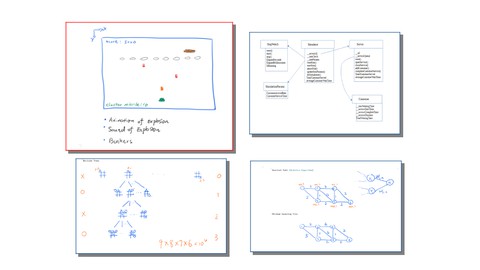
Design from Scratch use Python
Design from Scratch use Python, available at $34.99, with 15 lectures, and has 6 subscribers.
You will learn about Practical use of data structure and object-oriented analysis and programming Simple game design, play against machine Apply math and physics in your program Algorithms This course is ideal for individuals who are Someone with basic programming knowledge and want to learn how to write a non trivial program from scratch It is particularly useful for Someone with basic programming knowledge and want to learn how to write a non trivial program from scratch.
Enroll now: Design from Scratch use Python
Summary
Title: Design from Scratch use Python
Price: $34.99
Number of Lectures: 15
Number of Published Lectures: 15
Number of Curriculum Items: 15
Number of Published Curriculum Objects: 15
Original Price: $19.99
Quality Status: approved
Status: Live
What You Will Learn
- Practical use of data structure and object-oriented analysis and programming
- Simple game design, play against machine
- Apply math and physics in your program
- Algorithms
Who Should Attend
- Someone with basic programming knowledge and want to learn how to write a non trivial program from scratch
Target Audiences
- Someone with basic programming knowledge and want to learn how to write a non trivial program from scratch
This is an intermediate programming course for someone with basic programming knowledge and want to learn how to write a non trivial program from scratch. Some college level math and physics knowledge are definitely helpful. The demo projects are python but can be translated to other general-purpose programming languages very easily. (Or the design can be reused in another implementation language) All the demo projects here are small enough for learning but not trivial.
The goal of this course is to improve your overall problem solving skills using software.
The course is designed to focus on how to structure a program which has algorithms, UI and a few backend objects involved using OOP.
There are many other areas of knowledge that are important for a software engineer not covered here such as multi-threading, database etc. Having those may lose the focus of the course and introduce unnecessary issues for students to debug the projects. However, with good understanding of the course, students may find it helps learning other important areas in software development such as modeling large complex system (UML), Design Patterns & Architecture, etc.
To make best use of the course:
students are expected to have some knowledge of the following
– General Purpose Programming Language Knowledge
– Object-Oriented Concepts: class, field, property, methods, inheritance etc.
– Basic Data Structures and Algorithms: queue, stack, tree, graph etc.
– High school or college Math and Physics
Course Curriculum
Chapter 1: Design from Scratch — Introduction
Lecture 1: Introduction
Chapter 2: Project 1 – TicTacToe
Lecture 1: Part 1 – Design
Lecture 2: Part 2 – Decision Trees
Lecture 3: Part 3 – Code Review and Demo
Chapter 3: Project 2 – Space Invaders
Lecture 1: Part 1 – Sketch Out Design
Lecture 2: Part 2 – Build It
Lecture 3: Part 3 – Demo and Discussion
Chapter 4: Project 3 – Tetris
Lecture 1: Part 1 – Design
Lecture 2: Part 2 – Code Review and Demo
Chapter 5: Project 4 – Physics Simulation
Lecture 1: Part 1 – Elastic Collision and Vector 2D
Lecture 2: Part 2 – Simulation Details
Chapter 6: Project 5 – Maze
Lecture 1: Part 1 – Design Idea and Algorithms
Lecture 2: Part 2 – Implementation
Chapter 7: Project 6 – Customer Service Simulation
Lecture 1: Part 1 – Frontend
Lecture 2: Part 2 – Backend
Instructors
-
Haichuan Lin
Software Engineer
Rating Distribution
- 1 stars: 0 votes
- 2 stars: 0 votes
- 3 stars: 0 votes
- 4 stars: 0 votes
- 5 stars: 0 votes
Frequently Asked Questions
How long do I have access to the course materials?
You can view and review the lecture materials indefinitely, like an on-demand channel.
Can I take my courses with me wherever I go?
Definitely! If you have an internet connection, courses on Udemy are available on any device at any time. If you don’t have an internet connection, some instructors also let their students download course lectures. That’s up to the instructor though, so make sure you get on their good side!
You may also like
- Top 10 Language Learning Courses to Learn in November 2024
- Top 10 Video Editing Courses to Learn in November 2024
- Top 10 Music Production Courses to Learn in November 2024
- Top 10 Animation Courses to Learn in November 2024
- Top 10 Digital Illustration Courses to Learn in November 2024
- Top 10 Renewable Energy Courses to Learn in November 2024
- Top 10 Sustainable Living Courses to Learn in November 2024
- Top 10 Ethical AI Courses to Learn in November 2024
- Top 10 Cybersecurity Fundamentals Courses to Learn in November 2024
- Top 10 Smart Home Technology Courses to Learn in November 2024
- Top 10 Holistic Health Courses to Learn in November 2024
- Top 10 Nutrition And Diet Planning Courses to Learn in November 2024
- Top 10 Yoga Instruction Courses to Learn in November 2024
- Top 10 Stress Management Courses to Learn in November 2024
- Top 10 Mindfulness Meditation Courses to Learn in November 2024
- Top 10 Life Coaching Courses to Learn in November 2024
- Top 10 Career Development Courses to Learn in November 2024
- Top 10 Relationship Building Courses to Learn in November 2024
- Top 10 Parenting Skills Courses to Learn in November 2024
- Top 10 Home Improvement Courses to Learn in November 2024






















